The term Medium theory was first introduced by Marshall McLuhan in his 1964 book, Understanding Media. McLuhan’s theory was based on traditional media with the recent boom of TVs in the 1950s. In today’s society, however, a lot of the so-called Mediums have changed with the rise of Social Media, rise to the internet and information being more accessible than ever before.
The Medium theory expands on the idea that “the medium is the message” and is an “extension of ourselves.” (McLuhan, 1964). This in simpler terms is how the medium is used to present and show a message which in turn affects the initial message. Old forms of Media such as Newspapers were easier to control since there were only a handful of newspapers that the masses could consume depending on your region and most if not all would be behind a paywall. Nowadays with the use of social media and digital media, information is much more accessible and we as consumers can also push information ourselves whether it be as a conversation with a friend or to the world (Shek, 2022).
We can see that Medium in many cases changes the way society communicates, with the use of TikTok and Instagram we can see how despite both apps being fundamentally the same, the way people communicate is vastly different. An example of this can be seen in these two videos.
The Tiktok video that the Daily Mail posted on the topic
The Instagram video that the Daily Mail posted on the topic
The first thing we can examine is the fact that the two videos (by the Daily Mail) are about the same topic. However, these two videos are constructed differently with the one on TikTok having a quick “flashing” caption informing the viewers “Live Election BETS”. They then show the visuals of what they are talking about and finish the video from the 7-second mark. The video on Instagram however includes a voiceover on the topic and then jumps into interviews which makes the post more interactive and engaging by making it more subjective by asking the public, who they would bet on to become president for the upcoming US election. Part of the reason as to why the Daily Mail decided to do this was because of the age demographic of the audiences on the respective apps. With younger people having shorter attention spans and just wanting the core information as fast as possible, it makes sense why the Daily Mail and countless other creators try to condense everything as short as possible.
Because of this, you can already see how certain “serious” content topics or discussions would not do well on TikTok since TikTok is all about how much information you can push out while keeping it condensed and simple for the average consumer. TikTok’s algorithm is designed to keep users scrolling through videos so any long-form video goes against the algorithm which means your video will not be pushed out (Braga, 2023). It’s just too much and not worth it so platforms like the Daily Mail just display events happening without ever expanding on the headline all that much.
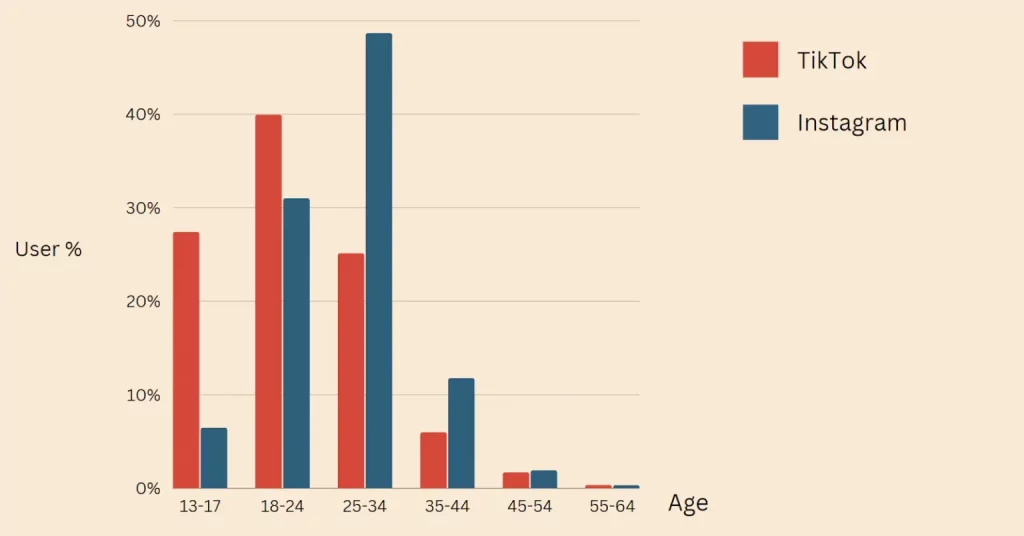
With these figures, we can see that TikTok has an overall younger audience targeted towards Gen Z (1995-2012) whereas Instagram’s audience is more on the older spectrum (Hey et al., 2023). I believe the reason why Instagram is more appealing to older audiences is because of the flexibility of Instagram covering all types of video formats. Another reason why Instagram is more popular with the older generations is because of how easy it is to use and interact with other people. The community on Instagram is easier to get accustomed to with the use of language. Instagram is also the older app compared to TikTok, being released in October 2010 compared to September 2016.
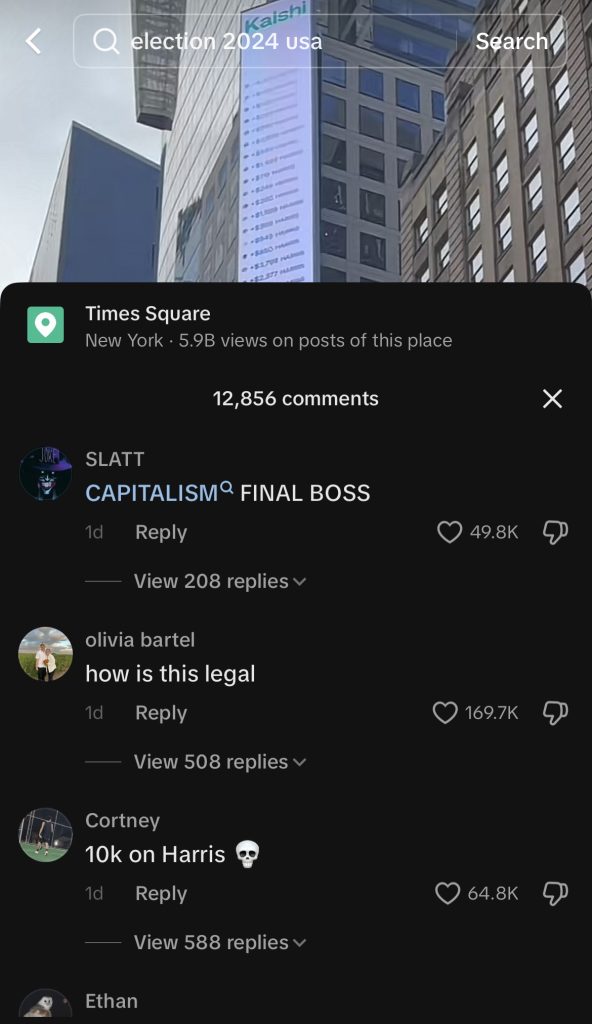
Tiktok Comments section 
Instagram Comments section 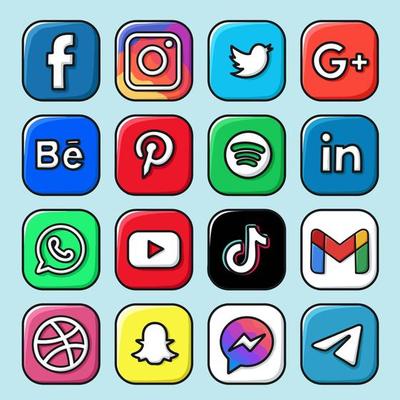
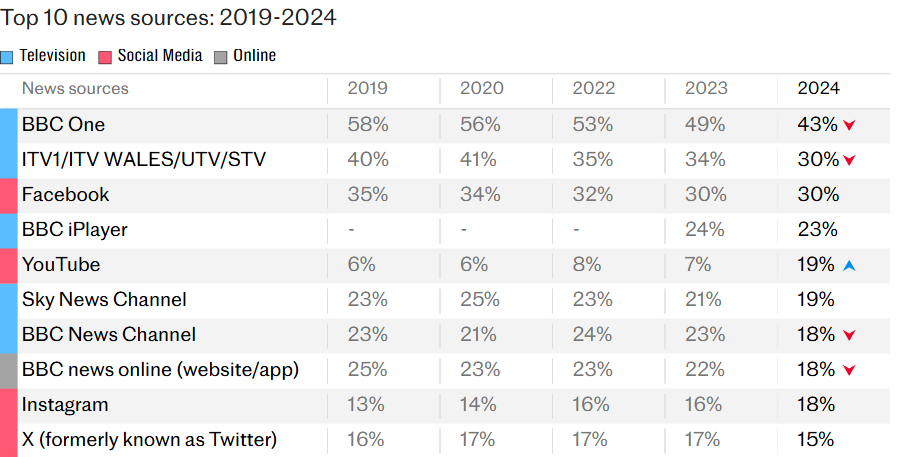
With social media or not, there are so many different examples of this whether it be social media to the difference in how news topics are covered like the differing ways in which CNN and Fox News present their information to the public. The only difference from 60 years ago to now is how many different options, we as consumers, have to choose from. Personally, I have watched little to no TV news for a couple of years now, and yet I still get information on what is happening around the world as quick as someone who still does. 60 years ago, before social media and the internet, this would be pretty much impossible. I am not the only one to stop watching TV news, as figures show there is a steady decline in getting their news from TV news, especially for the younger generations (Singh, 2024).
This is just an example of how Medium still controls the message in today’s society since most social media can be really similar yet, people’s experiences can be REALLY different because of what and how content is pushed out by the publishers and how consumers react to the information provided. Marshall McLuhan said in his writing “We shape our tools, and thereafter our tools shape us.”(McLuhan, 1964) this quote in my opinion reinforces how despite making similar apps or devices, the experience within these apps can be so different, especially in an era where information can come from anybody whether it be reliable or not.
Bibliography
Braga, A. (2023).┬ĀTikTok versus childrenŌĆÖs privacy: pros and cons of the most popular app for teens. [online] Humanium. Available at: https://www.humanium.org/en/tiktok-versus-childrens-privacy-pros-and-cons-of-the-most-popular-app-for-teens/.
Hey, M.U.A., Aumy, this is, Marketer, D., books, C.W. at Wpm.I. in, history, reading, writing, photography, movies and ask, bikes I. have always some tales to tell if you (2023).┬ĀTikTok Vs. Instagram: Major Differences in 2024. [online] https://wpsocialninja.com/. Available at: https://wpsocialninja.com/tiktok-vs-instagram/.
McLuhan, M. (1964). Understanding Media: The Extensions of Man. Berkeley, Calif.: Gingko Press.
Shek, T. (2022). 8 Major Advantages And Disadvantages of Digital Media – Tommy Shek,Tom Shek | Tommy Shek | Tom Shek. [online] Tommy Shek,Tom Shek. Available at: https://tommyshek.com/8-major-advantages-and-disadvantages-of-digital-media/.
Singh, A. (2024).┬ĀBBC One suffers record drop as audiences turn to social media for news, Ofcom reports. [online] The Telegraph. Available at: https://www.telegraph.co.uk/news/2024/09/09/bbc-one-audience-decline-ofcom-report/ [Accessed 4 Nov. 2024].
ŌĆī
ŌĆī
ŌĆī

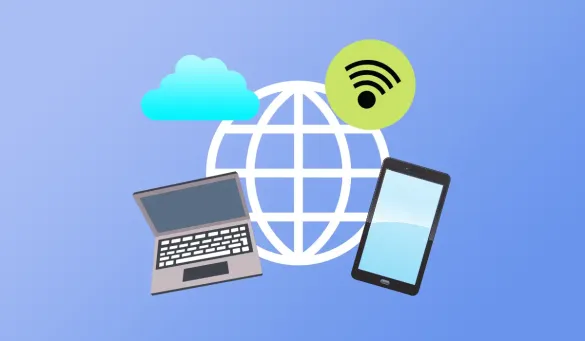
All in all what a great blog post. Some things that stood out to me the most is the fact that you included statistics which I havenŌĆÖt seen in many blog posts. Using statistics and data in your research allowed you to further back up your findings, creating a very solid argument. You also used real life examples too like TikTok and Instagram, which the readers are able to relate to. It would be good if you explored how accessibility to vast information could potentially lead to issues like misinformation which could affect the mediumŌĆÖs influence.
Great post, I like the discusses generational differences in social media usage. Including tips for critical information consumption for younger users or insights into how older generations adapt to new platforms would provide a well-rounded perspective, and good connecting of McLuhanŌĆÖs theories to social media. The way people comment on serious topics on TikTok and Instagram is very different. I think it would be helpful if you could explore more potential long-term effects of these shifts in communication styles.
First of all, wow. What an amazing blog post. The use of stats and graphs is a good way to give everyone an understanding of what your explaining. Also the connection of the theory to social media was smart, explaining the demographic on different apps and how they comment based on their ages. However, even though the post is great and all, its WAYYYYYY above the word count ¤Öé